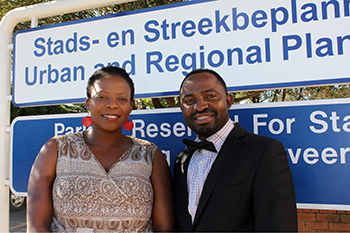Latest News Archive
Please select Category, Year, and then Month to display items
19 November 2018
|
Story Charlene Stanley
|
Photo Charlene Stanley
 Prof John Mubangizi, Dean of the Faculty of Law, encouraged delegates at the Fifth Annual International Mercantile Conference to share ideas on best international practice in their various fields.
Prof John Mubangizi, Dean of the Faculty of Law, encouraged delegates at the Fifth Annual International Mercantile Conference to share ideas on best international practice in their various fields.
“Don’t say anything online that you wouldn’t want plastered on a billboard with your face on it.”
This famous quote by international tech expert Erin Bury should be a guiding light when it comes to online habits in the workplace, according to Francois Cilliers, UFS Lecturer in Mercantile Law.
In his presentation Could Social Media be the Gateway to Employment Discrimination? he warned that employees have a responsibility not to bring their employers in disrepute through their comments on social media.
“Posts, updates, tweets, and comments are considered to be publications and can therefore never be seen as privileged information,” he explained.
Responsibility on employees and employers alike
He pointed out that employers also had a responsibility regarding the way in which they use the information about prospective employees obtained via social media.
“Nowadays, approximately 75% of companies hire through social media. In the US, recruiting companies spend hours researching candidates, making full use of what they can find on social media. It was found that 50–80% of employers frowned upon posts and pictures featuring drug and alcohol abuse, profanity, and bad grammar.”
He warned that employers needed to tread lightly, as a decision not to employ someone as a result of information on the prospective employee’s political views and sexual orientation could constitute unfair discrimination as set out in the Employment Equity Act.
“An employer who wishes to use a screening process (utilising social media) has to prove that the information and the process is objectively necessary and can be justified with reference to the inherent requirements of the job,” he explained.
“As technology and electronic systems advance, so too should the applicable labour laws.”
Cilliers’ presentation formed part of the Fifth Annual International Mercantile Law Conference recently hosted by the Faculty of Law on the Bloemfontein Campus.
Incorporating new technology in teaching and research
“This conference is an opportunity to share ideas on best practice in what is perceived as a ‘difficult’ field within Law,” said Prof John Mubangizi, Dean of the Faculty of Law, as he opened the proceedings. Topics in the discussion sessions ranged from Racism in the workplace and The underrepresentation of females in the judiciary, to Decriminalisation of cannabis: A recipe for healthy employer-employee relations?
“Conferences such as these help us to take advantage of the newest developments in technology to advance our teaching and research,” said Prof Mubangizi.
“To quote Einstein: ‘We can’t solve problems by using the same kind of thinking we used when we created them.’”
Young academic receives BRICS research funding
2017-04-13

Dr Thulisile Mphambukeli and Dr Victor Okorie
from the Department of Urban and Regional Planning
at the University of the Free State.
Photo: Rulanzen Martin
“It means a lot to me, as I am a young academic embarking on my postdoctoral research project. To be able to lead a team of researchers from various research institutions in South Africa is humbling.” This is what Dr Thulisile Mphambukeli had to say on being awarded a research grant by the South African BRICS Think Tank.
The think tank, in collaboration with the National Institute for the Humanities and Social Sciences (NIHSS), awarded the lecturer in Urban and Regional Planning at the University of the Free State (UFS) R150 000. She will spearhead a research project between BRICS (Brazil, Russia, India, China, and South Africa) universities. “They have awarded me a three-month grant to facilitate a process of combining various research projects under the BRICS Academic Cluster,” Dr Mphambukeli said.
Platform provides collaboration
“The academic cluster provides a platform for researchers and academics to engage in ongoing collaboration,” she said. The grant will enable her and her research partner, Dr Victor Okorie, postdoctoral fellow in the Department of Urban and Regional Planning at the UFS, to put together a research proposal to be submitted at the end of May 2017. If successful, her team will conduct a research study across BRICS countries over a period of three years. It will be done in collaboration with various South African universities, who will form a team to collaborate with researchers from BRICS universities.
Great accomplishment for UFS
“The funds we have received are quite a great accomplishment for the UFS and our department,” Dr Okorie said. The UFS has become a force to be reckoned with when it comes to emerging issues in BRICS politics and policies. “Our project looks at the provision of ecosystems, agriculture, and security and the UFS was chosen as the host institution.”